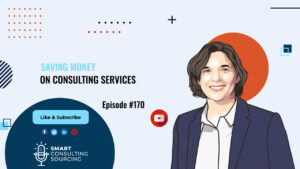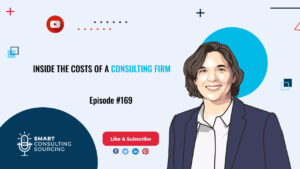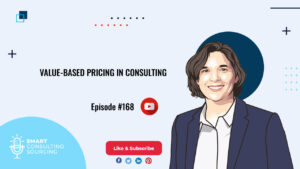Hello and welcome to episode 58 of our podcast: Smart Consulting Sourcing, THE podcast about Consulting Procurement.
My name is Hélène, and I’ll be your host today.
Each week I’ll give you the keys to better use, manage and source consulting services. This week, I’ll give you my tips to build positive relationships with your consulting firms
Last week, I answered 7 questions about internal vs external consultants. We saw that there are pros and cons to working with both internal and external consultants. Again, you should decide based on the needs of each project.
When you have an internal consulting group, it makes sense to integrate them into a project bid when their competencies cover the scope. Put them in competition when necessary, and measure performance. They will get all the keys to serving their internal clients better.
Positive and mutually beneficial relationships with business partners, clients, and collaborators are essential for every project. And effective communication is a crucial ingredient in every relationship.
So let’s talk about how having a great relationship with your Consulting provider can substantially benefit the project.
We have mentioned previously the importance of collaboration with consulting firms to maximize the project’s chances of success. When the consulting partners consider your company a “good client,” they will do their best to deliver the best work, assign their best teams, and remit their best price.
The main goal is to create mutually beneficial relationships with suppliers –
At its core, consulting should be based on a mutually beneficial partnership. If you treat procurement as a linear process that ends the moment the contract ink dries, you will probably have trouble getting the best possible results out of that partnership.
Try, instead, to treat the relationship as dynamic and flexible throughout the project. You and your consultants will both benefit and improve your business practices as a result.
The truth is that if you treat them fairly, there is a good chance that they act the same way. Expect them to deliver their work on time and quality. Treat them like partners that have a common objective. Give them feedback, good or bad, on their performance. Give them visibility on payments. Be thorough, but don’t dance on the head of a pin.
So you have to manage the life of the project.
No matter how hard you try, establishing and maintaining a relationship with consultants in executing a project will not be a linear process. During a project, some changes will occur that you didn’t account for during the proposal or contract. Whatever happens during the project, make sure you trace the most important events.
Keep track of the changes, such as:
You might have to add new tasks as a need becomes clearer or drop deliverables that turn out to be impossible or difficult to reach.
Organizations are in constant flux, and both sides may have to account for a turnover that requires adjustment and additional training.
Before the project starts, everything is an estimate; you may have to adjust the pace as the actual duration of the project comes into view.
Budget changes, project merges, project freezes, or any other events that affect the project’s execution.
Change management is necessary to ensure that these changes do not derail the project. When the changes are significant and impact the scope and the deliverables, you should consider amending the contract. For other cases, the minutes of the Steering Committee where the decision was made should suffice.
Any interaction with the consultants, especially when the performance is not right, should be traced thoroughly. Make sure to keep the minutes of the meetings and share them with the consultants timely.
And always measure performance –
For projects longer than three months, we recommend organizing a mid-project assessment. As early as possible, set yourself and your consultants a benchmark toward the middle of the project. It is the perfect time to review the current scope and deliverables and check if they align with the objectives and the current business environment.
Before the meeting, collect the main stakeholders’ feedback and prepare a summary to share with your consulting providers. The input should cover the traditional project management performance dimensions, such as project completion, planning, etc., but also a more qualitative aspect such as behavioral dimensions, impact, or skills adequation.
As you get into the details of any project, it’s easy to get carried away with minutia that ultimately won’t affect the overall success. A Mid-Project Assessment enables you and your team to ensure that these inevitable tangents don’t endanger the larger project’s timeline and success.
The Mid-Project Assessment should be a major event for everyone involved. Keep it separate from regular operational project reviews, which should happen in smaller circles and regularly. However, you can organize regular check-ins dedicated to the project reviews to anticipate the potential issues and allow the Consulting Firm to fix the problem as soon as it appears.
Finally, don’t drop the ball towards the end.
One of the most common mistakes when using consultants is to drop the ball towards the end of the project. Here is what happens and why it should be prevented: Reports get shelved. Information is being poorly transferred.
People that oppose the project step in to torpedo it one last time. Making sure the results will stick requires specific attention, and dedicated efforts, and it affects the overall success of the endeavor.
As the project is completed, ensure all deliverables and services are received and don’t make the final payment before verification. As a good practice, the last step in the reception and acceptance of the project is to perform an end-of-project assessment.
Because consulting is a human-to-human service, the quality of your relationship with your consulting partners will directly affect the result of your project. Putting the consultants in the right conditions to work, managing the project closely, and measuring performance are crucial steps to capture the right value from a consulting assignment.
That’s it for today. Next time, I’ll explain why you should put consultants in competition.
In the meantime, if you have any questions, or want to learn more about what we do at consulting quest, just send me an email at helene.laffitte@consultingquest.com
You can also have a look at our website smartconsultingsourcing.com to know more about our book and download free templates & guides to improve your consulting sourcing.
Bye and see you next week! Au revoir!
relationships with suppliers. relationships with suppliers. relationships with suppliers. relationships with suppliers. relationships with suppliers. relationships with suppliers. relationships with suppliers. relationships with suppliers. relationships with suppliers. relationships with suppliers. relationships with suppliers.







